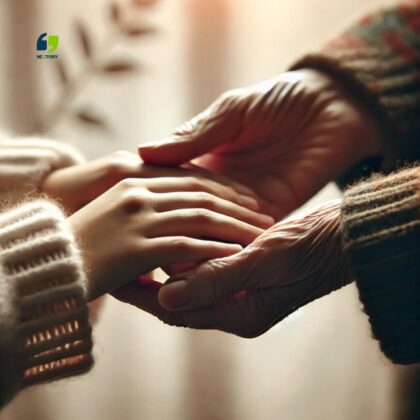Alaa Al-Rubaie
“In her final moments, she held my hand and said, ‘You are the daughter I never gave birth to.’ At that moment, I realized I was not just a guest in her home—I had become an inseparable part of her life.” With these words, Zozan Sido (30, from Serekaniye/Ras al-Ain) recounts the deep bond she formed with an older Armenian woman. Their relationship, forged during times of war and displacement, is a testament to the resilience of human connection—one that transcends social boundaries, even in the harshest circumstances.
A New Beginning Amid Displacement
When Serekaniye/Ras al-Ain was overrun by Turkish-backed Syrian factions in 2019, Zozan and her family found themselves among the thousands forced to flee their homes in search of safety. “We left everything behind and headed to Qamishli,” she recalls. “The journey was difficult, filled with fear and uncertainty.”
After spending days crammed into a relative’s home, Zozan’s family decided to rent an apartment in Qamishli’s al-Wusta neighborhood. “The place was in terrible condition—broken windows, no water, no electricity. It felt like we had gone from stability to a real nightmare.”
It was in this rundown building that Zozan first met the older Armenian woman. While struggling to connect electricity to pump water, she was approached by her new neighbor, who immediately offered to help.
“She was in her seventies, living alone after her children had left—some abroad, others to different parts of Syria. She suffered from multiple health conditions, one of which confined her to a wheelchair. She did not hesitate to open her door and offer assistance despite her struggles,” Zozan recalls.
At first, Zozan would check in on her neighbor from time to time, but their relationship quickly grew into something more. She began helping with household chores, caring for her health, and preparing healthy food. “Her words of gratitude still echo in my ears,” Zozan says.
The repeated visits evolved into a unique friendship between two women of different generations, backgrounds, and hometowns—one that resembled a mother-daughter relationship. “I initially looked after her out of neighborly concern, but over time, she filled the void left by my mother’s absence, and I never felt alone with her around,” Zozan says.
The older woman, in turn, shared stories of her life, memories of her children, and the lessons she had learned over the years.
Between Care and Farewell: Lasting Memories of the Late Neighbor
“On New Year’s Eve, she invited us to celebrate. My siblings and I decorated a Christmas tree in the corner of her living room. Watching us, she said, ‘You are my children now. This tree has brought joy back into my heart after years of being deprived of nature due to my illness,'” Zozan recounts. That night was filled with warmth and laughter, creating cherished moments of happiness for all of them.
Knowing how much the woman missed her children, Zozan made it a tradition to give her small gifts on Mother’s Day each year. “I always reassured her that I would be by her side, and she would always respond with, ‘May God bless you, my daughter.'”
As the years passed and her health deteriorated, she became entirely dependent on Zozan and her family. “She trusted us so much that she gave me the key to her home, saying, ‘This is your house now.’ I felt the weight of that trust, but it was also a testament to the strength of our bond.”
In her final days, Zozan stayed in close contact with the woman’s daughter in Aleppo, but the security situation made it nearly impossible for her to visit. After multiple attempts, the daughter finally bid her mother a last farewell. During those difficult days, Zozan experienced difficult emotions, yet she continued to provide emotional support to her older neighbor, who passed away soon after, leaving behind an irreplaceable void.
She also left behind a cherished memory that Zozan held onto—a necklace with a cross, which the lady always wore around her neck.
“This woman taught me that humanity and social bonds transcend religion, language, age, and all other differences. Through my three years with her, I learned patience, generosity, and the true value of human connection. She taught me to use less salt in food and replace it with an abundance of love,” Zozan says, still holding on to the memories of her late neighbor, even two years after her passing.

